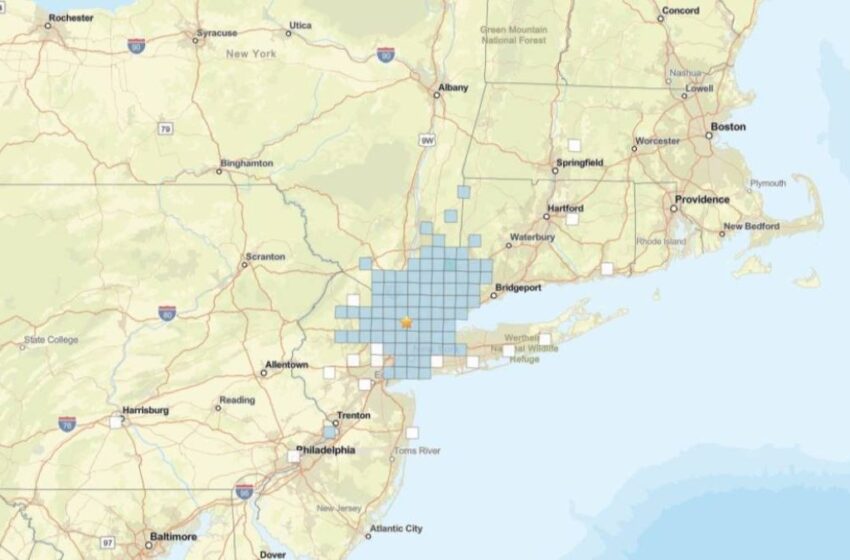Earthquake in Hillsdale, New Jersey: Everything you should know

Earthquake in Hillsdale, New Jersey. Picture: USGS
Residents of Hillsdale, New Jersey and surrounding areas were jolted early Tuesday morning by a 2.7 magnitude earthquake, the second tremor in just four days to impact the New York-New Jersey metro region. Though classified as a minor quake, the shaking was felt as far as New York City, causing brief alarm across the Tri-State area.
According to the U.S. Geological Survey (USGS), the earthquake struck at 3:50 a.m. ET on August 5, with an epicenter near Hillsdale in Bergen County. The quake originated at a shallow depth of 5 kilometers, contributing to the widespread vibration reports despite its low magnitude.
What Areas Felt the Earthquake?
The tremor was felt across multiple counties in northern New Jersey, parts of Rockland County, New York, and even in some neighborhoods of Manhattan and the Bronx. Many residents took to social media around dawn to report hearing rumbling sounds, feeling beds shake, or witnessing light fixtures sway.
Reports were especially concentrated in:
- Andover
- Bethel
- Brookfield
- Danbury
- Darien
- Greenwich
- New Canaan
- New Fairfield
- New Milford
- Norwalk
- Redding
- Ridgefield
- Sandy Hook
- Shelton
- Sherman
- Southbury
- Stamford
- Terryville
- Wilton
- Woodbury
The shallow depth of the quake amplified its sensation despite not being classified as dangerous.
Was There Any Damage?
As of Tuesday afternoon, no injuries or structural damage have been reported. Local police departments, fire crews, and emergency management officials have confirmed that critical infrastructure remains intact, and no evacuations were necessary.
The New Jersey Office of Emergency Management said it is monitoring the situation but emphasized that the quake posed no ongoing risk to residents. Public transit, power grids, and water systems were not affected.
Still, minor tremors like this serve as a reminder of the region’s seismic vulnerability, even in areas not typically associated with earthquakes.
Why Are Earthquakes Happening in New Jersey?
While earthquakes in the Northeast U.S. are relatively rare, they are not unheard of. New Jersey sits on a series of ancient fault lines, and when underground pressure builds, even small slips can cause noticeable tremors.
This is the second quake in the region in less than a week, following a 2.6 magnitude event on August 2 in neighboring Rockland County, New York. Seismologists say these events are not uncommon and often occur in clusters, especially during seasonal temperature shifts or rainfall fluctuations that stress the bedrock.
According to USGS data, New Jersey experiences several small quakes each year, though most are below 2.0 in magnitude and go unfelt.
READ ALSO
Tsunami waves in Hawaii and California… how other US coastal cities should prepare
What Should Residents Do After an Earthquake?
Even with no major damage, residents are encouraged to review basic earthquake preparedness steps:
- Check your home for shifted items or structural cracks.
- Secure heavy furniture or wall fixtures.
- Update emergency kits, including flashlights, water, and first-aid supplies.
- Know safe zones in your home: under sturdy tables or against interior walls.
- Stay alert for aftershocks, which could follow in the hours or days ahead.
Officials also advise against calling 911 unless there is an actual emergency to keep lines open for urgent cases.
What Experts Are Saying
Experts from the Lamont-Doherty Earth Observatory at Columbia University confirmed that the August 5 quake falls within “normal background seismic activity” for the region but noted the increased public sensitivity following the pandemic and extreme weather events.
“The Northeast isn’t earthquake-proof,” said seismologist John Armbruster. “We’re just less prepared mentally when they do happen.”
While the Hillsdale earthquake may not have caused damage, it has sparked renewed interest in disaster preparedness in one of the most densely populated regions in the U.S. As seismic monitoring improves and public awareness grows, events like this serve as small but powerful reminders: earthquakes can happen anywhere, even in New Jersey.

